
Nanomaterials
metrics 2024
Fostering Interdisciplinary Insights in Nanotechnology
Introduction
Nanomaterials, published by MDPI in Switzerland, stands as a leading platform in the realm of materials science and chemical engineering. Since its inception in 2011, this Open Access journal has garnered significant attention, reflected in its impressive rankings—placing in the Q1 category for Chemical Engineering and Q2 for Materials Science as per the 2023 quartiles. The journal consistently fosters innovation and interdisciplinary research through its rigorous peer-reviewed articles, inviting submissions that span a wide range of topics from nanostructured materials to advanced engineering techniques. With a commendable Scopus rank—#44 in Chemical Engineering and #93 in Materials Science, both within the top percentiles—Nanomaterials serves as an essential resource for researchers, professionals, and students eager to stay abreast of developments in this rapidly evolving field. Since its establishment, it has distinctively contributed to the academic community by facilitating insightful knowledge exchange and promoting high-quality research around nanoscale materials.
Metrics 2024
 -
- 4.40
4.40 4.70
4.70 -
-Metrics History
Rank 2024
IF (Web Of Science)
JCI (Web Of Science)
Quartile History
Similar Journals

APL Materials
Exploring breakthroughs in materials research.APL Materials is a prestigious open access journal published by AIP Publishing that has been at the forefront of disseminating cutting-edge research in the fields of materials science and engineering since its inception in 2013. With an impressive impact factor reflecting its significance, APL Materials ranks securely in the Q1 quartile in both Engineering (miscellaneous) and Materials Science (miscellaneous) categories, underscoring its role as a vital resource for innovative scientific inquiry. Ranked highly in Scopus, particularly in General Engineering (24/307) and General Materials Science (78/463), the journal provides a platform for researchers, professionals, and students to share their findings and advancements that push the boundaries of material applications. Furthermore, its open access policy ensures that high-quality research is freely available to a global audience, fostering collaborative advancements in the scientific community. As the journal continues to evolve through to 2024, it remains committed to presenting groundbreaking studies that contribute to the advancement of materials science and engineering disciplines.Explore APL Materials to stay at the cutting edge of research and innovation.
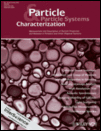
PARTICLE & PARTICLE SYSTEMS CHARACTERIZATION
Fostering Collaboration in Particle ResearchPARTICLE & PARTICLE SYSTEMS CHARACTERIZATION is a distinguished journal dedicated to advancing the knowledge within the fields of Chemistry, Condensed Matter Physics, and Materials Science. Published by WILEY-V C H VERLAG GMBH in Germany, this journal has established a solid reputation since its inception in 1984, showcasing research aimed at understanding the intricate properties and behaviors of particulate systems. With an impressive Q2 ranking in its respective categories and Scopus ranks indicating a robust standing in the global research community, it serves as an essential resource for researchers, professionals, and students. Although it does not currently offer Open Access options, its comprehensive articles and reviews provide valuable insights that contribute significantly to the ongoing discourse in these scientific domains. As it prepares to celebrate four decades of publication, PARTICLE & PARTICLE SYSTEMS CHARACTERIZATION continues to provide a vital platform for emerging knowledge, fostering innovation and collaboration among scientists dedicated to the study of particle systems.

ADVANCED FUNCTIONAL MATERIALS
Empowering Researchers with Open Access to Groundbreaking DiscoveriesADVANCED FUNCTIONAL MATERIALS is a leading journal published by WILEY-V C H VERLAG GMBH, prominently recognized in the fields of biomaterials, chemistry, condensed matter physics, and materials science. With an impressive impact factor and a distinguished position in the Q1 quartile across multiple categories including nanoscience and nanotechnology, this journal serves as a vital platform for researchers and professionals committed to innovating in functional materials. Since its inception in 2000, ADVANCED FUNCTIONAL MATERIALS has published high-quality peer-reviewed articles that push the boundaries of materials science, exploring new frontiers in electronic, optical, and magnetic materials. The journal's dedication to open access ensures that its groundbreaking findings are readily available to a global audience, fostering collaboration and knowledge-sharing among scholars and practitioners in the field. For those seeking to stay at the forefront of materials research, ADVANCED FUNCTIONAL MATERIALS is an essential resource.
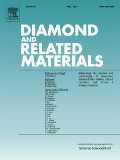
DIAMOND AND RELATED MATERIALS
Pioneering insights into the world of diamonds.DIAMOND AND RELATED MATERIALS, published by Elsevier Science SA, serves as a premier international platform for the dissemination of high-quality research in the fields of materials science, electrical engineering, and chemistry, with a specialized focus on diamond and its related materials. With an ISSN of 0925-9635 and an E-ISSN of 1879-0062, this journal has established itself within the top quartiles, reflecting its influential contribution to the scientific community, particularly in the categories of Chemistry (miscellaneous) and Electrical Engineering, among others. The journal's wide scope encompasses both theoretical and applied aspects of diamond research, making it an essential resource for professionals and academics alike. The current rankings position it favorably within its respective disciplines, with a notable 79th percentile in General Physics and Astronomy and strong standings in related categories. Although it does not offer open access, researchers can stay informed of cutting-edge advancements and methodologies through its comprehensive articles and reviews, enriching the wider discourse in advanced materials research.

Journal of Ovonic Research
Fostering Interdisciplinary Insights in Ovonic Research.Journal of Ovonic Research is a distinguished publication dedicated to advancing the fields of electronic, optical, and magnetic materials. Published by VIRTUAL CO PHYSICS SRL, this journal offers a platform for researchers to share innovative findings and developments that push the boundaries of technology and materials science. With an ISSN of 1842-2403 and an E-ISSN of 1584-9953, it provides an important service to the academic community, particularly within Romania and beyond. Despite its recent inception in 2011, the journal has gained traction in the academic landscape, reflecting a Q4 quartile ranking in crucial categories such as Electronic, Optical and Magnetic Materials, as well as in Physics and Astronomy. The Scopus rankings further underscore its positioning, ranking within the 25th to 37th percentile across various disciplines, making it a valuable resource for professionals and students alike. Although the journal currently operates on a non-open access basis, it remains committed to exploring the latest advancements in materials science, encouraging interdisciplinary collaboration and fostering a deeper understanding of surface, coating, and film technologies. As the field evolves, Journal of Ovonic Research stands as a beacon for scholarly communication, bridging the gap between research and practical application.
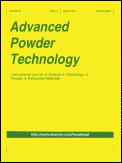
ADVANCED POWDER TECHNOLOGY
Transforming Ideas into Powder SolutionsADVANCED POWDER TECHNOLOGY, published by Elsevier, is a premier academic journal dedicated to advancing the field of powder technology and its applications across various domains, such as chemical engineering and materials science. With an ISSN of 0921-8831 and an E-ISSN of 1568-5527, this journal has established itself as a leader in research dissemination, boasting an impressive Q1 ranking in both Chemical Engineering (miscellaneous) and Mechanics of Materials as of 2023. Further enhancing its reputation, it ranks 42nd out of 398 in the field of Mechanics of Materials and 36th out of 273 in General Chemical Engineering, demonstrating its significant impact within these disciplines. With a publishing history spanning from 1990 to 2024, ADVANCED POWDER TECHNOLOGY offers a wealth of knowledge and research findings, positioning itself as an indispensable resource for researchers, professionals, and students eager to explore cutting-edge advancements and applications of powder systems. Access to its latest research is available through institutional subscriptions, ensuring efficiency and support for ongoing academic endeavors.

Inorganic and Nano-Metal Chemistry
Advancing Knowledge in Inorganic Chemistry and Nanotechnology.Inorganic and Nano-Metal Chemistry is a premier journal published by Taylor & Francis Inc, focusing on innovative research and advancements in the fields of inorganic chemistry and nano-metal applications. With an increasing impact in the academic community, this journal has established itself within the Q3 category of both Inorganic Chemistry and Physical and Theoretical Chemistry as of 2023, reflecting its global recognition and influence. The journal is accessible as an Open Access publication, ensuring that research findings are freely available to a broad audience, promoting transparency and collaboration in scientific exploration. Based in the United Kingdom, Inorganic and Nano-Metal Chemistry aims to disseminate high-quality peer-reviewed articles that not only highlight fundamental studies but also push the boundaries of technological applications in areas such as catalysis, materials science, and nanotechnology. Researchers, professionals, and students will find this journal an invaluable resource for the latest developments and interdisciplinary insights in the ever-evolving landscape of inorganic and nano-metal chemistry.
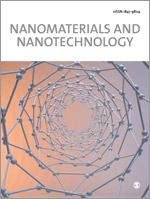
Nanomaterials and Nanotechnology
Advancing Innovations in Nanomaterials ResearchNanomaterials and Nanotechnology is a premier journal published by HINDAWI LTD, dedicated to advancing knowledge in the rapidly evolving fields of nanomaterials and nanoscale applications. Established as an Open Access platform since 2011, the journal aims to disseminate high-quality research that provides insights into nanotechnology's manifold aspects, including biotechnology, ceramics and composites, as well as electrical and electronic engineering. With a compelling impact factor reflected in its robust Scopus rankings—placing it in the 80th percentile in Engineering and the 72nd percentile in Biotechnology—it stands as a key resource for researchers, professionals, and students seeking to stay at the forefront of innovation in materials science. The journal occupies a distinguished position in the academic community, featuring studies that explore the synthesis, characterization, and application of nanomaterials, thereby contributing significantly to scientific discourse and technological advancement in this critical area.
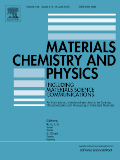
MATERIALS CHEMISTRY AND PHYSICS
Illuminating the Path of Materials Science AdvancementsMATERIALS CHEMISTRY AND PHYSICS is a leading peer-reviewed journal published by Elsevier Science SA, focusing on the intersection of materials science and condensed matter physics. With an esteemed impact factor and a distinguished reputation in its field, this journal holds a Q1 ranking in Condensed Matter Physics and a Q2 ranking in miscellaneous Materials Science categories as of 2023. Spanning over three decades since its inception in 1983, it provides a vital platform for researchers, professionals, and students to disseminate cutting-edge findings and innovations in materials characterization, properties, and applications. The journal is indexed in Scopus, boasting impressive rankings that reflect its commitment to publishing high-quality research. Although it does not currently offer an Open Access option, it remains an essential resource for those seeking to stay at the forefront of materials chemistry and physics.
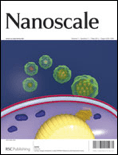
Nanoscale
Advancing the Frontiers of Nanoscience.Nanoscale is a premier academic journal published by the Royal Society of Chemistry, dedicated to advancing the field of nanoscience and nanotechnology. With both its ISSN (2040-3364) and E-ISSN (2040-3372) ensuring wide accessibility, the journal is renowned for its high-impact research contributions, reflected in its impressive 2023 Impact Factor and prestigious Q1 ranking in both Materials Science (Miscellaneous) and Nanoscience and Nanotechnology categories. Since its inception in 2009, Nanoscale has fostered a collaborative platform where leading researchers from around the globe share their innovative findings across a multitude of topics spanning from material synthesis to applications in nanotechnology. The journal not only serves as a valuable resource for professionals, researchers, and students but also actively engages the academic community in discussing emerging trends, thus shaping the future of nanoscience. Situated in the heart of the UK at Thomas Graham House, Science Park, Milton Rd, Cambridge CB4 0WF, Nanoscale remains a key publication for those looking to keep abreast of the latest breakthroughs in an ever-evolving field.